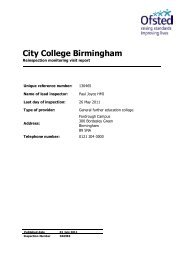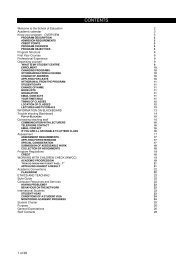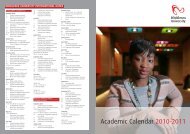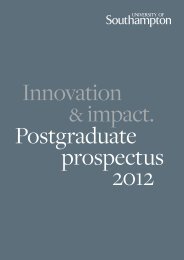undergraduate
undergraduate
undergraduate
- No tags were found...
Create successful ePaper yourself
Turn your PDF publications into a flip-book with our unique Google optimized e-Paper software.
Bachelor of Engineering<br />
(Mechatronics)<br />
G69 - JO<br />
Duration: 4 Years<br />
Practicum: Yes<br />
Mechatronics Engineering is the integration of electrical,<br />
electronic and computer engineering with mechanical and<br />
industrial engineering enabling the development of intelligent<br />
machines and advanced manufacturing and processing systems.<br />
Areas of study within Mechatronics include mechanics, computer<br />
aided design and computer aided manufacturing, analog<br />
and digital electronics, signal analysis, electro‐mechanical<br />
systems, advanced materials, sensor technology, automatic<br />
control, robotics, system design and development and project<br />
management. Graduates will have competencies in electrical,<br />
electronic and mechanical engineering, and be able to participate<br />
in and lead complex multi-disciplinary projects.<br />
Mechatronics Engineers have diverse employment<br />
opportunities in most sectors of industry including product<br />
design and development, manufacturing, mining and resource,<br />
process control and automation, public utilities, road and<br />
transport, defence, aerospace, and consulting.<br />
Admission requirements<br />
Year 12 Maths; or equivalent.<br />
Year 12 Physics or equivalent is desirable.<br />
Additional Course Information<br />
Professional Accreditation<br />
Engineers Australia has granted Accreditation to this course.<br />
Practicum Placement<br />
During the course, students will be required to undertake a<br />
minimum of 12 weeks practical work experience located in<br />
an engineering industry environment. This will normally be<br />
undertaken during a vacation period, even though it is listed as a<br />
unit for Year 4 (ENS4111).<br />
Course Structure<br />
Requires the completion of 33 units / 480 credit points.<br />
This course has three components:<br />
• Core Units - 30 Units<br />
• Electives - 2 Units<br />
• Practicum - 1 Unit<br />
Year 1 - Semester 1<br />
Credit Points<br />
ENS1154 Introduction to Engineering 15<br />
ENS1162 Electrical Engineering 1A 15<br />
MAT1236 Calculus 1 15<br />
SCP1111 Physics of Motion 15<br />
Year 1 - Semester 2<br />
ENS1253 Electrical Engineering 1B 15<br />
ENM1102 Engineering Drawing and Computer<br />
Aided Design 15<br />
ENS1115 Materials and Manufacturing 1 15<br />
MAT1163 Linear Algebra 15<br />
Year 2 - Semester 1<br />
ENM2104 Instrumentation and Measurement 15<br />
ENS2159 Engineering Innovation and Ethics 15<br />
ENS2456 Digital Electronics 15<br />
MAT2437 Differential Equations 15<br />
Year 2 - Semester 2<br />
CSP1150 Programming Principles 15<br />
ENM2210 Engineering Mechanics 15<br />
ENS2110 Materials and Manufacturing 2 15<br />
ENS2259 Thermodynamics 15<br />
Year 3 - Semester 1<br />
ENS3260 Advanced Materials and Manufacturing<br />
Systems 15<br />
ENM3218 Fluid Mechanics 15<br />
ENS3180 Finite Element Methods 15<br />
Elective 1 15<br />
Year 3 - Semester 2<br />
ENS2257 Microprocessor Systems 15<br />
ENS3105 Mechanical Design and Development 15<br />
ENS3553 Signals and Systems 15<br />
ENS4240 Industrial Control 15<br />
Year 4 - Semester 1<br />
ENS4111 Engineering Practicum 0<br />
ENS4152 Project Development 15<br />
ENS4360 Power Electronics 15<br />
ENS4251 Control Systems 15<br />
ENS4442 Robotics 1 15<br />
Year 4 - Semester 2<br />
ENS4253 Engineering Project 15<br />
ENS3220 Electrical Machines and Transformers 15<br />
ENS4543 Engineering Management 15<br />
Elective 2 15<br />
Careers<br />
Mechatronics Engineer.<br />
See more course information:<br />
reachyourpotential.com.au/courses/G69<br />
Bachelor of<br />
Engineering Science<br />
K94 - JO<br />
Duration: 3 Years<br />
Provides a high-quality and broad-based coverage of<br />
multi-disciplinary engineering. In the modern engineering<br />
environment, large-scale engineering projects are<br />
increasingly likely to be of a highly multi-disciplinary nature,<br />
requiring engineers from diverse backgrounds to be able to<br />
work effectively as a team to deliver the outcomes. In such<br />
environments, a broader understanding of engineering, beyond<br />
one specific area of specialisation, is highly desirable and<br />
advantageous.<br />
Developing such breadth in four-year engineering courses is a<br />
challenge as it compromises the level of specialist knowledge<br />
that is also required from a graduate engineer.<br />
Admission requirements<br />
Year 12 Maths; or equivalent and Year 12 Physics; or equivalent.<br />
Additional Course Information<br />
This educational program follows the ‘3+2’ model of<br />
engineering education which has been widely adopted in<br />
Europe. Graduates of ECU’s ‘3+2’ engineering program will<br />
have an edge in their engineering careers due to greater depth<br />
and breadth in their education compared to standard four-year<br />
engineering courses.<br />
Engineering & technology<br />
53

















